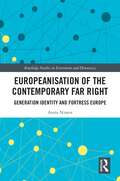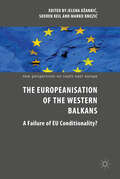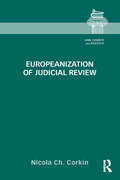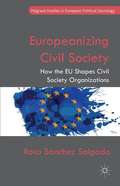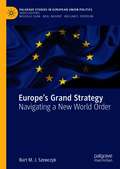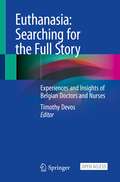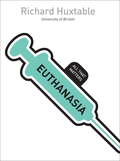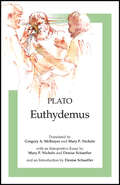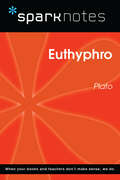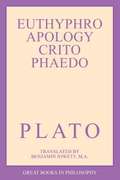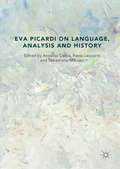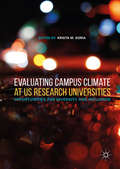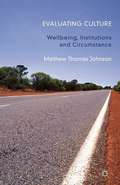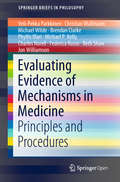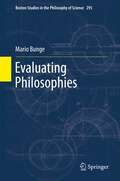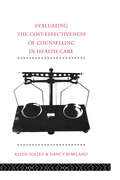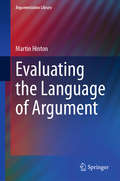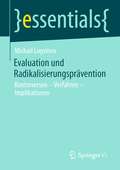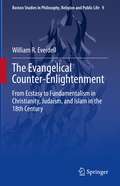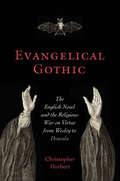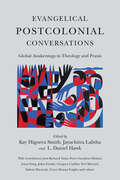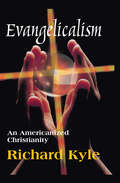- Table View
- List View
Europeanisation of the Contemporary Far Right: Generation Identity and Fortress Europe (Routledge Studies in Extremism and Democracy)
by Anita NissenEuropeanisation of the Contemporary Far Right explores the role of transnational European identity in far-right mobilisation strategies. Focusing on the national members of two trans-European far-right coalitions – Generation Identity and Fortress Europe – the author explores the extent to which European far-right extra-parliamentary actors Europeanise their mobilisation. Drawing on social movement literature, the book argues that national extra-parliamentary actors’ Europeanisation processes are influenced by their political and discursive opportunities and resources. Focusing on the groups’ mobilisation during the ‘refugee crisis’ (2015–2017), the analysis considers the groups’ frames, collective action, and coalition-building in the period, finding that the depth of the groups’ resources particularly affects their capacity to mobilise. This book will be of interest to scholars, students, and civil society actors in fields related to the far right, European studies, social movements, and migration.
The Europeanisation of the Western Balkans: A Failure of EU Conditionality? (New Perspectives on South-East Europe)
by Soeren Keil Jelena Džankić Marko KmezićThis volume casts a fresh look on how the political spaces of the Western Balkan states (Croatia, Bosnia and Herzegovina, Serbia, Montenegro, Kosovo, Macedonia and Albania) are shaped, governed and transformed during the EU accession process. The contributors argue that EU conditionality in the Western Balkans does not work ‘effectively’ in terms of social change because rule transfer remains a ‘contested’ business, due to veto-players on the ground and strong legacies of the past. The volume examines specific policy areas, salient in the enlargement process and to a different degree incorporated in the accession criteria, as well as EU foreign policy in the spheres of post-conflict stabilisation, democratization and the rule of law promotion.
Europeanization of Judicial Review (Law, Courts and Politics)
by Nicola Ch. CorkinEuropeanization of Judicial Review argues that the higher complexity of the political framework in which laws are made today leads to less well-designed laws and loop-holes, allowing politicians to leave decisions to the courts. The higher complexity of the political framework is a result of the need in the EU to consider both national and European legal and political rules when phrasing new laws. Both to decrease the complexity in the design of legislation and to preserve the ideal of the rule of law, the courts now are more likely to rule laws unconstitutional. The book employs a wide range of quantitative and qualitative methods to collect new data about the German, Austrian, and Italian constitutional courts over the last four decades. These three courts have a comparable history, theoretical background, and structure while differing in two key components: length of EU membership and legitimacy perception. Corkin employs multi-method research based on over fifty interviews with judges, politicians and civil servants; content analysis of abstract judicial review cases over three decades; and a database of over 300 variables relating to the courts and their surroundings. Her data reveals that in abstract judicial review, and in the wider political arena, political culture has become more confrontational due to attitude changes in politicians and judges. These attitude changes can be directly linked to the EU and have wide-ranging implications for legitimacy, democracy and political methodology. Presenting a bridge between the revitalized realist and legalist debate, Europeanization of Judicial Review will contribute to socio-legal theory, literature on comparative courts, and both new institutionalism and Europeanization theory.
Europeanizing Civil Society
by Rosa Sanchez SalgadoThe European Union clearly matters for Civil Society Organizations (CSOs). EU officials and European political entrepreneurs has been crucial in the promotion of funding and access opportunities, but they have been proven to have little capacity to use CSOs for their own purposes.
Europe’s Grand Strategy: Navigating a New World Order (Palgrave Studies in European Union Politics)
by Bart M. SzewczykThis book proposes that the European Union should craft a grand strategy to navigate the new world order based on a four-pronged approach. First, European decision-makers (both in Brussels and across EU capitals) should take a broader view of their existential interests at stake and devote greater time and resources to serving them within the wider cause of the liberal order. Second, Europe needs to help reinvigorate the West by restoring a sense of solidarity through fairer distribution of benefits and burdens. Third, it should develop separate strategies for parts of the world, such as Russia and China, where liberal values are not likely to be attainable in the foreseeable future yet order is still necessary. Fourth, Europe needs to clarify its core interests elsewhere and help stabilize the Middle East and Africa. With this book, the author seeks to lay the essential building blocks for developing a European strategy, which is a complex process involving multiple decision-makers and institutions.
Euthanasia: Experiences and Insights of Belgian Doctors and Nurses
by Timothy DevosThis open access book has been written by ten Belgian health care professionals, nurses, university professors and doctors specializing in palliative care and ethicists who, together, raise questions concerning the practice of euthanasia. They share their experiences and reflections born out of their confrontation with requests for euthanasia and end-of-life support in a country where euthanasia has been decriminalized since 2002 and is now becoming a trivial topic.Far from evoking any militancy, these stories of life and death present the other side of a reality needs to be evaluated more rigorously.Featuring multidisciplinary perspectives, this though-provoking and original book is intended not only for caregivers but also for anyone who questions the meaning of death and suffering, as well as the impact of a law passed in 2002. Presenting real-world cases and experiences, it highlights the complexity of situations and the consequences of the euthanasia law.This book appeals to palliative care providers, hematologists, oncologists, psychiatrists, nurses and health professionals as well as researchers, academics, policy-makers, and social scientists working in health care. It is also a unique resource for those in countries where the decriminalization of euthanasia is being considered. Sometimes shocking, it focuses on facts and lived experiences to challenge readers and offer insights into euthanasia in Belgium.
Euthanasia: All That Matters
by Richard HuxtableThe Dignitas clinic in Switzerland may be a long way away. But the issues around euthanasia can suddenly become very close to home. To many, it seems remarkable that in a society where freedom of choice is eulogised, thousands of people find that there is one last choice that they are not free to make. But as this book will show, euthanasia is an issue at the intersection of new technology, old laws, and timeless ethical quandaries, so that even apparently clear-cut cases have many contradictions. Drawing on the latest research and cases from around the world, Richard Huxtable drills deep into the key issues around euthanasia. His is a new, balanced look at an important issue, and it will appeal to lawyers, medical students and - most importantly - those who find themselves or their relatives faced with end of life dilemmas.
Euthanasia: All That Matters (All That Matters)
by Richard HuxtableThe Dignitas clinic in Switzerland may be a long way away. But the issues around euthanasia can suddenly become very close to home. To many, it seems remarkable that in a society where freedom of choice is eulogised, thousands of people find that there is one last choice that they are not free to make. But as this book will show, euthanasia is an issue at the intersection of new technology, old laws, and timeless ethical quandaries, so that even apparently clear-cut cases have many contradictions. Drawing on the latest research and cases from around the world, Richard Huxtable drills deep into the key issues around euthanasia. His is a new, balanced look at an important issue, and it will appeal to lawyers, medical students and - most importantly - those who find themselves or their relatives faced with end of life dilemmas.
Euthydemus
by Plato Gregory A. McBrayer Mary P. Nichols Denise SchaefferFrom the Introduction:"Neglected for ages by Plato scholars, the Euthydemus has in recent years attracted renewed attention. The dialogue, in which Socrates converses with two sophists whose techniques of verbal manipulation utterly disengage language from any grounding in stable meaning or reality, is in many ways a dialogue for our times. Contemporary questions of language and power permeate the speech and action of the dialogue. The two sophists—Euthydemus and his brother Dionysodorus—explicitly question whether speech has any connection to truth and specifically whether anything can be said about justice and nobility that cannot also be said about their opposites."Focus Philosophical Library translations are close to and are non-interpretative of the original text, with the notes and a glossary intending to provide the reader with some sense of the terms and the concepts as they were understood by Plato’s immediate audience.FeaturesNotes, glossary, and an interpretive essay.
Euthyphro (SparkNotes Philosophy Guide)
by SparkNotesEuthyphro (SparkNotes Philosophy Guide) Making the reading experience fun! SparkNotes Philosophy Guides are one-stop guides to the great works of philosophy–masterpieces that stand at the foundations of Western thought. Inside each Philosophy Guide you&’ll find insightful overviews of great philosophical works of the Western world.
Euthyphro, Apology, Crito, and Phaedo
by Benjamin Jowett PlatoIn these four short works by Plato, we come to experience the full range of Socrates' penetrating mind. In the Euthyphro, Socrates searches after the truth about the nature of piety, even as he makes his way to Athens to answer an indictment leveled against him. The Apology recounts Socrates' attempt to defend himself against the charge of impiety. Once condemned, Socrates finds himself imprisoned to await death. The Crito captures his views on his relationship with the state and what each has a right to expect from the other. Finally, the Phaedo recalls the death scene as Socrates discusses the nature of the soul and immortality just before succumbing to the hemlock.
Eva Picardi on Language, Analysis and History
by Annalisa Coliva Paolo Leonardi Sebastiano MoruzziThe volume honours Eva Picardi – her philosophical views and interests, as well as her teaching – collecting eighteen essays, some by former students of hers, some by colleagues with whom she discussed and interacted. The themes of the volume encompass topics ranging from foundational and historical issues in the philosophy of language and the philosophy of logic and mathematics, as well as issues related to the recent debates on rationality, naturalism and the contextual aspects of meaning. The volume is split into three sections: one on Gottlob Frege’s work – in philosophy of language and logic –, taking into account also its historical dimension; one on Donald’s Davidson’s work; and one on the contextualism-literalism dispute about meaning and on naturalist research programmes such as Chomsky’s.
Evaluating Campus Climate at US Research Universities: Opportunities for Diversity and Inclusion
by Krista M. SoriaThis book examines campus climate data collected from undergraduates at several large, public research universities across the nation to enhance understanding of the long-term impact of campus climate on student success. Many universities have refocused their attention and energy on campus climate, defined in this volume as students’ perceptions of how welcoming and respectful their campus environments are for students from different social identities. As structural diversity continues to grow more complex on college campuses around the nation, campus leaders have begun to take more steps to understand campus climate and address persistent inequalities, acts of discrimination, and violence against students from diverse backgrounds. The authors in this volume address initiatives to improve campus climate and provide empirical evidence on the effectiveness of those programs.
Evaluating Culture
by Matthew Thomas JohnsonFrom which evaluative base should we develop policies designed to promote wellbeing among different cultural groups in varying circumstances? This book engages with needs and capabilities to advance normative functionalist assessment of the success with which cultural institutions promote eudaemonic wellbeing in given, determinate circumstances.
Evaluating Evidence of Mechanisms in Medicine: Principles and Procedures (SpringerBriefs in Philosophy)
by Veli-Pekka Parkkinen Christian Wallmann Michael Wilde Brendan Clarke Phyllis Illari Michael P Kelly Charles Norell Federica Russo Beth Shaw Jon WilliamsonThis book is open access under a CC BY license. This book is the first to develop explicit methods for evaluating evidence of mechanisms in the field of medicine. It explains why it can be important to make this evidence explicit, and describes how to take such evidence into account in the evidence appraisal process. In addition, it develops procedures for seeking evidence of mechanisms, for evaluating evidence of mechanisms, and for combining this evaluation with evidence of association in order to yield an overall assessment of effectiveness. Evidence-based medicine seeks to achieve improved health outcomes by making evidence explicit and by developing explicit methods for evaluating it. To date, evidence-based medicine has largely focused on evidence of association produced by clinical studies. As such, it has tended to overlook evidence of pathophysiological mechanisms and evidence of the mechanisms of action of interventions. The book offers a useful guide for all those whose work involves evaluating evidence in the health sciences, including those who need to determine the effectiveness of health interventions and those who need to ascertain the effects of environmental exposures.
Evaluating Philosophies
by Mario BungeThe first part deals with philosophies that have had a significant input, positive or negative, on the search for truth; it suggests that scientific and technological are either stimulated or smothered by a philosophical matrix; and it outlines two ontological doctrines believed to have nurtured research in modern times: systemism (not to be mistaken for holism) and materialism (as an extension of physicalism). The second part discusses a few practical problems that are being actively discussed in the literature, from climatology and information science to economics and legal philosophy. This discussion is informed by the general principles analyzed in the first part of the book. Some of the conclusions are that standard economic theory is just as inadequate as Marxism; that law and order are weak without justice; and that the central equation of normative climatology is a tautology-which of course does not put climate change in doubt. The third and final part of the book tackles a set of key concepts, such as those of indicator, energy, and existence, that have been either taken for granted or neglected. For instance, it is argued that there is at least one existence predicate, and that it is unrelated to the so-called existential quantifier; that high level hypotheses cannot be put to the test unless conjoined with indicator hypotheses; and that induction cannot produce high level hypotheses because empirical data do not contain any transempirical concepts. Realism, materialism, and systemism are thus refined and vindicated.
Evaluating the Cost-Effectiveness of Counselling in Health Care
by Nancy Rowland Keith TolleyLimited resources in health care mean that the value of counselling is decided in a highly competitive economic arena. Keith Tolley and Nancy Rowland have written a practical guide to the basic principles of evaluating cost-effectiveness to enable counsellors and service providers to carry out analysis for themselves. They provide helpful definitions of technical terms and use case studies to demonstrate how to apply the theory in different contexts.
Evaluating the Language of Argument (Argumentation Library #37)
by Martin HintonThis book is concerned with the evaluation of natural argumentative discourse, and, in particular, with the language in which arguments are expressed. It introduces a systematic procedure for the analysis and assessment of arguments, which is designed to be a practical tool, and may be considered a pseudo-algorithm for argument evaluation.The first half of the book lays the theoretical groundwork, with a thorough examination of both the nature of language and the nature of argument. This leads to a definition of argumentation as reasoning expressed within a procedure, which itself yields the three frames of analysis used in the evaluation procedure: Process, Reasoning, and Expression. The second half begins with a detailed discussion of the concept of fallacy, with particular attention on fallacies of language, their origin and their effects. A new way of looking at fallacies emerges from these chapters, and it is that conception, together with the understanding of the nature of argumentation described in earlier sections, which ultimately provides the support for the Comprehensive Assessment Procedure for Natural Argumentation.The first two levels of this innovative procedure are outlined, while the third, that dealing with language, and involving the development of an Informal Argument Semantics, is fully described. The use of the system, and its power of analysis, are illustrated through the evaluation of a variety of examples of argumentative texts.
Evaluation und Radikalisierungsprävention: Kontroversen – Verfahren – Implikationen (essentials)
by Michail LogvinovDieses essential befasst sich mit Paradigmen und Verfahren der Evaluation und schlägt einen Bogen zu aktuellen Kontroversen rund um das Thema „Evaluationsansätze in der Radikalisierungsprävention“. Michail Logvinov zeichnet Defizite der Evidenzschaffung nach und formuliert Vorschläge für die Wissenschaft und Praxis. Darüber hinaus plädiert er für eine Intensivierung des Wissenstransfers zwischen der Evaluationsforschung und Fachpraxis mit dem Ziel, gegenstandsadäquate wirkungsorientierte Evaluationsdesigns zu entwickeln und zu testen.
The Evangelical Counter-Enlightenment: From Ecstasy to Fundamentalism in Christianity, Judaism, and Islam in the 18th Century (Boston Studies in Philosophy, Religion and Public Life #9)
by William R. EverdellThis contribution to the global history of ideas uses biographical profiles of 18th-century contemporaries to find what Salafist and Sufi Islam, Evangelical Protestant and Jansenist Catholic Christianity, and Hasidic Judaism have in common. Such figures include Muḥammad Ibn abd al-Waḥhab, Count Nikolaus Zinzendorf, Jonathan Edwards, John Wesley, Jean-Jacques Rousseau, and Israel Ba’al Shem Tov. The book is a unique and comprehensive study of the conflicted relationship between the “evangelical” movements in all three Abrahamic religions and the ideas of the Enlightenment and Counter-Enlightenment. Centered on the 18th century, the book reaches back to the third century for precedents and context, and forward to the 21st for the legacy of these movements. This text appeals to students and researchers in many fields, including Philosophy and Religion, their histories, and World History, while also appealing to the interested lay reader.
Evangelical Gothic: The English Novel and the Religious War on Virtue from Wesley to Dracula (Victorian Literature and Culture Series)
by Christopher HerbertEvangelical Gothic explores the bitter antagonism that prevailed between two defining institutions of nineteenth-century Britain: Evangelicalism and the popular novel. Christopher Herbert begins by retrieving from near oblivion a rich anti-Evangelical polemical literature in which the great religious revival, often lauded in later scholarship as a "moral revolution," is depicted as an evil conspiracy centered on the attempted dismantling of the humanitarian moral culture of the nation. Examining foundational Evangelical writings by John Wesley and William Wilberforce alongside novels by Charles Dickens, George Eliot, Bram Stoker, and others, Herbert contends that the realistic popular novel of the time was constitutionally alien to Evangelical ideology and even, to some extent, took its opposition to that ideology as its core function. This provocative argument illuminates the frequent linkage of Evangelicalism in nineteenth-century fiction with the characteristic imagery of the Gothic–with black magic, with themes of demonic visitation and vampirism, and with a distinctive mood of hysteria and panic.
Evangelical Postcolonial Conversations: Global Awakenings in Theology and Praxis
by Kay Higuera Smith Jayachitra Lalitha L. Daniel HawkHow can the church respond to issues of imperialism, race and globalization? Constructing an evangelical postcolonial theology may be the solution to dealing with these ever-growing issues. Gathering together essays presented at the 2010 Postcolonial Roundtable at Gordon College, this groundbreaking volume seeks to reconcile the ugly history of cultural dominion and colonialism with new perspectives on global society. Rethinking and reimagining the concepts of identity, power, interpretation and historiography through the lens of Christianity, the editors provide readers with new ways of understanding and bettering the world. "The Christian faith of the future must be a joint enterprise in which the descendants of the colonized and the descendants of the colonizers come together, reflect on the past and imagine a different and better future together," contributor Brian McLaren states. "That work will involve risks and dangers for both groups, and the contributions of both are essential. One lesson the gospel surely teaches us is this: we are all connected." Addressing themes like nationalism, Christology and western conquest, contributors discuss reasons Christians need to be careful how they frame their conversations on global topics. The language of "mission" can be misconstrued in light of postcolonial perspectives, and the essays dig into the role of evangelicalism in modern Christian outreach to help us keep pace with what God is doing in our era.
Evangelicalism: An Americanized Christianity
by Richard KyleMost forms of religion are best understood in the con- text of their relationship with the surrounding culture. This may be particularly true in the United States. Certainly immigrant Catholicism became Americanized; mainstream Protestantism accommodated itself to the modern world; and Reform Judaism is at home in American society. In Evangelicalism, Richard Kyle explores paradoxical adjustments and transformations in the relationship between conservative Protestant Evangelicalism and contemporary American culture.Evangelicals have resisted many aspects of the modern world, but Kyle focuses on what he considers their romance with popular culture. Kyle sees this as an Americanized Christianity rather than a Christian America, but the two are so intertwined that it is difficult to discern the difference between them. Instead, in what has become a vicious self-serving cycle, Evangelicals have baptized and sanctified secular culture in order to be considered culturally relevant, thus increasing their numbers and success within abundantly populous and populist-driven American society. In doing so, Evangelicalism has become a middle-class movement, one that dominates America's culture, and unabashedly populist.Many Evangelicals view America as God's chosen nation, thus sanctifying American culture, consumerism, and middle-class values. Kyle believes Evangelicals have served themselves well in consciously and deliberately adjusting their faith to popular culture. Yet he also thinks Evangelicals may have compromised themselves and their future in the process, so heavily borrowing from the popular culture that in many respects the Evangelical subculture has become secularism with a light gilding of Christianity. If so, he asks, can Evangelicalism survive its own popularity and reaffirm its religious origins, or will it assimilate and be absorbed into what was once known as the Great American Melting Pot of religions and cultures? Will the Gospel of the American dream ultimately engulf and destroy the Gospel of Evangelical success in America?This thoughtful and thought-provoking volume will interest anyone concerned with the modern-day success of the Evangelical movement in America and the aspirations and fate of its faithful.
